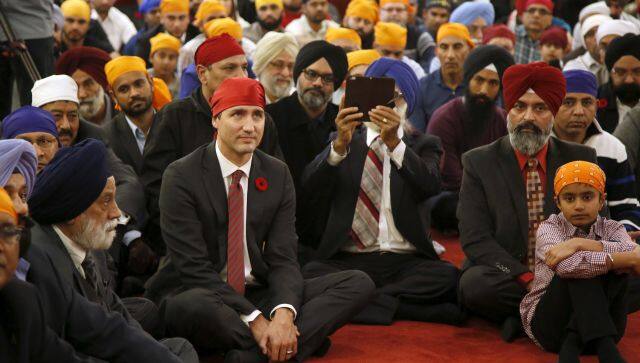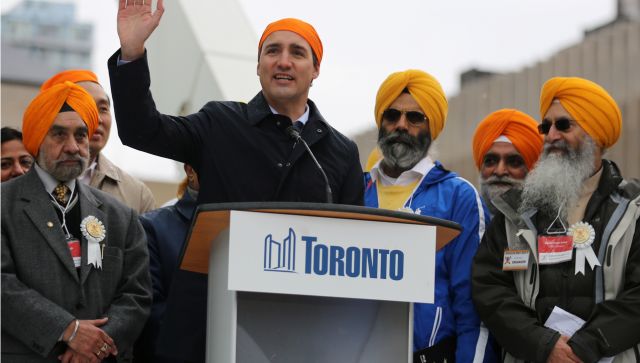India and Canada’s relations have taken a nosedive after both countries expelled each other’s top diplomats. This came after Canadian prime minister Justin Trudeau hinted at the country’s security agencies probing a “possible link” between India and the murder of pro-Khalistan separatist Hardeep Singh Nijjar in British Columbia in June. India’s foreign ministry responded sharply, dismissing Canada’s charges. It accused Canada of sheltering “Khalistani terrorists and extremists”, who “threaten India’s sovereignty and territorial integrity”. “The inaction of the Canadian government on this matter has been a long-standing and continuing concern,” the ministry of external affairs (MEA) said in a statement. “Canadian political figures have openly expressed sympathy for such elements”, and “the space given in Canada to a range of illegal activities including murders, human trafficking and organised crime is not new”, the statement read.
This is not the first time that India has accused the Trudeau government of not doing enough to tackle the Khalistani issue. But, why is Justin Trudeau seen to have a “soft” stance on Khalistani separatists who propagate anti-India sentiments in Canada? Let’s understand. Canada’s large Indian diaspora Canada is home to one of the largest Indian diaspora, which accounts for about 1.4 million of the country’s total 40 million population. Out of these 1.4 million people of Indian origin in Canada, about 770,000 are Sikhs, Reuters reported citing the 2021 census. In fact, after India, Canada has the highest population of Sikhs, who form a major voter base. Sikhs lawmakers and officials are present at all levels of the Canadian government. However, not all Canadian Sikhs support the demand for Khalistan and neither it is a “hot” issue for them, as per Indian Express. “Canadian leaders do not want to lose Sikh votes but they wrongly think the loud minority of Khalistanis are all Sikhs of Canada,” Terry Milewski, who wrote a book on Khalistan, told Deutsche Welle (DW) in 2022. [caption id=“attachment_13142332” align=“alignnone” width=“640”] After India, Canada has the most number of Sikhs. Reuters File Photo[/caption] Canada has itself been a victim of
Khalistan extremism
when Air India flight 182, the Kanishka, flying from Montreal to London was bombed by terrorists. Pro-Khalistani leader Talwinder Singh Parmar, who was based in Canada, was considered the mastermind of the bombing. Trudeau’s political ‘compulsions’ Trudeau’s Liberal Party is heading a minority government in Canada. In 2021, the Liberal Party came to power with just 159 seats, with Trudeau becoming the prime minister for the third time. Last March, he struck a deal with the New Democratic Party (NDP) to stay in power until 2025. The left-leaning NDP is headed by Jagmeet Singh, who is seen as a Khalistani supporter. Singh once took part in a Khalistani separatist rally, reported Scroll. “Trudeau is treading a thin line, heading a minority government backed significantly by Jagmeet Singh, who is crucial for his political survival. Though the 2019 elections had sealed the bond between them, Singh is now seen as someone who is his trusted partner supporting him whenever he is attacked by opposition on issues,” The Tribune quoted observers as saying. ALSO READ:
Diplomats expelled, trade talks on hold: How India-Canada ties have plunged to new lows
In March this year, Singh had called for Trudeau’s intervention after Punjab Police’s crackdown on Khalistan sympathiser Amritpal Singh, which had led to the suspension of the internet in the Indian state. Calling them “draconian measures”, the NDP leader said it is “unsettling for many given their historical use to execute extrajudicial killings and enforced disappearances during the 1984 Sikh Genocide.”
After India, Canada has the most number of Sikhs. Reuters File Photo[/caption] Canada has itself been a victim of
Khalistan extremism
when Air India flight 182, the Kanishka, flying from Montreal to London was bombed by terrorists. Pro-Khalistani leader Talwinder Singh Parmar, who was based in Canada, was considered the mastermind of the bombing. Trudeau’s political ‘compulsions’ Trudeau’s Liberal Party is heading a minority government in Canada. In 2021, the Liberal Party came to power with just 159 seats, with Trudeau becoming the prime minister for the third time. Last March, he struck a deal with the New Democratic Party (NDP) to stay in power until 2025. The left-leaning NDP is headed by Jagmeet Singh, who is seen as a Khalistani supporter. Singh once took part in a Khalistani separatist rally, reported Scroll. “Trudeau is treading a thin line, heading a minority government backed significantly by Jagmeet Singh, who is crucial for his political survival. Though the 2019 elections had sealed the bond between them, Singh is now seen as someone who is his trusted partner supporting him whenever he is attacked by opposition on issues,” The Tribune quoted observers as saying. ALSO READ:
Diplomats expelled, trade talks on hold: How India-Canada ties have plunged to new lows
In March this year, Singh had called for Trudeau’s intervention after Punjab Police’s crackdown on Khalistan sympathiser Amritpal Singh, which had led to the suspension of the internet in the Indian state. Calling them “draconian measures”, the NDP leader said it is “unsettling for many given their historical use to execute extrajudicial killings and enforced disappearances during the 1984 Sikh Genocide.”
In June 1984, the Indian Army had stormed the Golden Temple in Amritsar to flush out Khalistani militants. Months later, the then prime minister Indira Gandhi was shot dead by her Sikh bodyguards in retaliation to the Army’s operation, which was seen as an “attack” on the Golden Temple. In December 2018, Canada released its annual ‘Public Report on the Terrorist Threat to Canada’, which mentioned ‘Sikh extremism’ and Khalistan for the first time. As per India Today, the report said Canada continues to face threats from “individuals inspired to commit violence based on other forms of extremism, including from…Sikh (Khalistani) extremists”. However, after backlash from some Sikh groups, the Trudeau government released a revised report in April 2019 without any mention of Sikh extremism and Khalistan, reported the news channel. Trudeau’s government is accused of not taking a hard stance against Khalistani separatists because of political compulsions. But its not just Trudeau, Canada has been considered a “safe haven” for Khalistan supporters for long, noted Indian Express. “The meek Canadian response to the Khalistani challenge was a frequent target of Indian politicians as far back as 1982, when Prime Minister Indira Gandhi complained about it to Prime Minister Pierre Trudeau (Justin’s father),” Terry Milewski wrote in his book Blood for Blood: Fifty Years of the Global Khalistan Project (2021). “Speaking to ThePrint, Vishnu Prakash, former Indian High Commissioner to Canada, said in February 2018: “Over the years, the Canadian political establishment, across the spectrum (whether it is the NDP, Conservatives or Liberals) has been mollycoddling Khalistani elements. Under the Trudeau government, this has increased.” In 2017, Trudeau attended a Khalsa Day event where Khalistani flags, and portraits of slain Khalistani leader Jarnail Singh Bhindranwale and Talwinder were reportedly displayed. The media reported Trudeau was “snubbed” by India during his 2018 Delhi visit for being soft on Khalistani militants. What have India and Canada said? India has often raised the issue of anti-India activities allegedly carried out by pro-Khalistani leaders and groups in Canada. In March, violent protests were organised by Khalistan supporters outside the Indian consulate in Vancouver, following which New Delhi flagged concerns of “separatist and extremist elements” against Indian diplomatic missions and consulates in Canada. External Affairs Minister (EAM) S Jaishankar said in June that Canada’s “constrained” response on the Khalistani issue has affected its ties with India in the the last few years. “For us how Canada has dealt with the Khalistani issue has been a long-standing concern. Because very frankly, they seem to be driven by vote-bank politics”. “Their responses have all been, to the best of my understanding, actually constrained by what they regard as vote bank compulsions,” he was quoted as saying by PTI. Sushant Singh, a lecturer in political science at Yale University, told Scroll, “The Indian government believes that the Canadian government is soft on Khalistani supporters in Canada and working against Indian interests”. In July, India issued summons to the Canadian High Commissioner after posters by pro-Khalistan groups labelled Indian diplomats as “killers” following the death of Nijjar . Canada called the “promotional material” circulated ahead of the ‘Khalistan Freedom Rally’ “unacceptable”, saying it takes its “obligations regarding safety of diplomats very seriously”. While Trudeau has spoken against violence in Canada, he has also defended the right to “freedom of expression, freedom of conscience, and freedom of peaceful protest”. “Canada will always defend freedom of expression, freedom of conscience and freedom of peaceful protest, and it’s extremely important to us. At the same time we are always there to prevent violence and to push back against hatred. On the issue of a community, it’s important to remember that the actions of a few didn’t represent the whole community or Canada,” he told reporters after his meeting with Prime Minister Narendra Modi on the sidelines of the G20 Summit earlier in September. With inputs from agencies
)